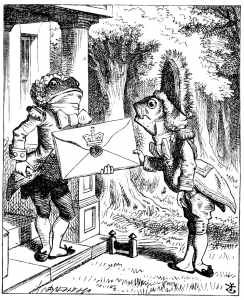A Whackadoodle discussion on Kailua Beach about being grateful while still fighting back. Including a thank you note to the Forty-Fifth President that may or may not be sent.
A Whackadoodle discussion with Lynn Marie Sager
I came up behind her as she sat bent over a picnic table scribbling away. I could tell from the half dozen crumpled up pages strewn around her that she was struggling to put her thoughts into words.
“Whatcha writing,” I asked innocently from over her shoulder.
She jumped nearly a half foot, dropped her pen, and froze. A few seconds later she began berating me. “Geeze. Don’t do that. That’s just like the rudest thing ever. You totally messed up my concentration.” She held her hands out before her to see if they were shaking. They weren’t.
I stepped up onto the picnic table bench, swung around, and planted my bottom on the table in front of her. “Sorry,” I laughed, not really meaning it. “I suppose I couldn’t help myself.”
“Couldn’t, or didn’t want to?” she accused.
“You are right, of course.” I admitted, still laughing. “I wanted to see your reaction, and it was pretty funny.”
“Ha. Ha,” she replied and reached for her fallen pen.
I picked up one of the crumpled pages. “What’s this,” I asked, smoothing out the paper.
“One of a dozen failed attempts,” she grumbled.
I read the salutation, and had to adjust my eyes. “You’re trying to write a thank you note to the ex-president?” I asked in wonder.
She grunted and said nothing.
“Why are you trying to write a thank you note to the forty-fifth President of the United States?” I asked suddenly seriously.
“I like irony, alright,” she admitted. “But it’s not working.”
“What’s not working?”
“My brain.”
I glanced around at the crumpled papers scattered across the table. On impulse, I took the paper in my hand, turned it into the tightest wad that I could, and threw it at the top of her head. “I know what’s going on here,” I told her.
“What,” she said, rubbing her temple.
“You are trying to write a letter when you still don’t know what you want to say.” I began grabbing all the fallen papers, and tossing them in the public trash can near the picnic area. “Have you forgotten everything that I have ever taught you about the writing process? You can’t edit while you’re trying to write. You shouldn’t try writing what you haven’t organized. And it’s a waste of time organizing ideas that you have explored.”
“Is that what I’m doing?” she mumbled. “Trying to edit and write at the same time?”
I looked up from the picnic table towards the white sand beach soaking in the sun. “Let’s take a walk,” I offered. “It’s a perfect day for brainstorming.”
Silently, she began shoving her belongings into her backpack. Once her things were settled, we headed off together towards the waiting shore. “So,” I asked as our feet hit the sand. “Why are you trying to write a thank you note to the forty-fifth president?”
“Truthfully?” she admitted. “Because I actually think that I have a lot to be grateful for. His being President has taught me so much about my history, my country, our democracy. Shoot, I had never even heard of the Tulsa Massacre before him, let alone Juneteenth. And then he goes and decides to have a rally in Tulsa on the anniversary of Juneteenth. Dang. We all learned a lot that week.”
“Yeah, we did, didn’t we,” I replied. “Some more than others,” I added, thinking back to Herman Cain.
“And another thing,” she continued, ignoring my comment. “I never really understood WWII before him. I mean, I knew how the war started, but I never could understand how a man like Hitler could come to power. Germany was a Republic, and they voted Hitler into power. He started dividing the country. He turned regular people against their own Jewish citizens. He began to control the media. I mean, I never really understood fascism until I started seeing it develop in my own country, and the forty-fifth President made that possible. He helped me understand.”
“Tough way to learn a lesson,” I countered.
“And the Supreme Court,” she burst out, still ignoring me. “All the ruling they made this year alone. I always took the courts for granted. I never realized how important they were until this week, when they decided that there is no right to privacy in the US Constitution, that the States should write their own abortion laws, that the EPA can’t regulate air pollution, that New York has to loosen its gun laws, and that we can’t even count on having a Miranda warning if we get picked up for questioning.”
“Are you planning on being picked up?” I teased.
“No one plans on being picked up,” she said dryly.
“Well, I’ll give you this advice if you ever are picked up,” I smirked. “You only say two things. One, ‘Am I being held, or am I free to go?’ If they say you are free to go, you go. If they say you are being held, you say, “I’d like to speak with my lawyer.”
“Really?” She raised an eyebrow.
“Now that they no longer have to Miranda you,” I nodded. “Really.”
“Jeeze,” she shook her head. “More to learn every day.”
We walked the beach for a while in silence. Off in the distance, I could see windsurfers riding the waves. Something about what she had said troubled me. She needed to thank more than just one man for everything she’d learned. “You know,” I said after composing my thoughts. “I don’t think that you can really thank Forty-Five for the courts. He helped of course, but the one to really thank is the Senate Majority leader at the time. After all, he’s the one who refused to consider anyone a Democratic President nominated, while shoving through as many federal appointments as he could when a Republican was nominating.”
“See, that’s what I mean,” she said, once again frustrated. “For the past, what, going on four, five, six, seven years. The whole thing has felt like one giant real life civics lesson.” Her eyes had gone wide. “I mean, I have learned how impeachment works, and how it doesn’t work. I know about the filibuster. I understand the difference between misinformation and disinformation. I know about voting rights, or the lack of them. I get that we are a Republic with States that have begun to turn their backs on democracy. I get how fragile our government is if we don’t invest in it, and I’m scared.”
At last we had the truth of it. I stopped walking and asked, “Were you really planning to send this thank you letter to Forty-Five?”
“Maybe,” she mumbled. “I sort of wanted to.”
“Why?”
“I don’t know,” she admitted, dragging her toe through the sand. “I just wanted to be heard. I just wanted to tell him how I felt, and I figured the only way he would read it is if he thought I was thanking him.”
“And do you think it would do any good if he read your thank you letter?”
“Probably not. I doubt he’d even care.”
“So who would read it?”
“His assistant.”
“No, I mean, who might want to read it.”
“I don’t know,” she said, squinting into the sun. “Maybe kids like me.”
“And who are they?”
“People who are as angry as me for what we have been forced to learn; what we are forced to live with unless we work like dogs to change things.”
“It’s a hard thing to wake up, isn’t it?”
“It makes me want to go back to sleep.”
“And yet you won’t,” I assured her. “You still have a letter to write.”
“And who’s gonna read it?” she asked dismally.
“I will,” I told her. “Your friends will. Kids like you might.”
“Might,” she repeated.
“What would you tell them if they did read it?”
She stared at the horizon for some time, her mind finally working. Eventually she said, “I think I would tell them two things. We need to hold others accountable, and we need to hold ourselves accountable.”
“Good beginning,” I encouraged. “And?”
“Well,” she struggled a bit with her words. “It’s like when we don’t hold people accountable, they just keep doing what they’re doing, right?”
“Right,” I agreed. “So how do we hold them accountable?”
“I don’t know,” she answered. “Take them to court, boycott their products, call them out, don’t vote for them. And,” she added after a moment. “Support people who are trying to take them to court, boycott their products, call them out, or vote them out.”
“All good suggestions,” I grinned. “And how does one hold oneself accountable?”
“We need to stay informed. We need to pay attention. We need to stop taking our democracy for granted because if we don’t, we’re gonna lose it. And,” she added with emphasis, “We absolutely need to know that the people running our elections are impartial because in the end, our vote is the only voice we have.”
“Not the only voice,” I assured her. “But certainly one of our most important.”
“And we need to start playing the long game,” she added thoughtfully.
“The long game?”
“We can’t expect things to change overnight. We can’t expect one election, and two more Senators will do it. We have to build alliances. We have to work together. We need to vote in every election for the rest of our lives, not just for a President every four years. We need to vote for school boards, neighborhood boards, and our local legislatures. All of it. Plus we need to encourage our friends to do the same. We have to stop taking our democracy for granted. We need to be able to trust that our elected officials are working for us and not somebody else.”
“To do that, we’ll also need to start taking the money out of politics,” I added. “But of course that will require a government that agrees to keep the money out of politics.”
“Dang,” she said, shaking her head, and dropping into the sand. “You can be so depressing at times.”
“Sorry,” I said, this time meaning it. I squatted down beside her and added, “I think we all might be feeling like we’ve been asleep and suddenly woke up in a Catch-22.”
“What’s a Catch-22?”
“It’s brilliant book written by Joseph Heller, and which he published the year I was born. It’s about a young pilot just trying to stay alive during WWII, while surrounded by Catch-22s.”
“But what does Catch-22 mean?”
“Why don’t you look it up on that phone of yours,” I suggested.
Dutifully, she pulled out her phone, and after a few taps, she had the answer, “Merriam-Webster defines it as ‘a problematic situation for which the only solution is denied by a circumstance inherent in the problem or by a rule.’ Then they give an example from show business. You can’t get work unless you have an agent, but you can’t get an agent unless you have done some work.”
“Exactly,” I agreed, having been caught in that very catch during my youth.
“So it’s like, we can’t get money out of the government so long as money keeps pouring into the government. Is that right?”
“That is the catch,” I nodded. “The problem is finding the solution.”
“So how did the pilot solve it in the book?” She squinted up at me.
“He didn’t,” I admitted. “But just before the book ends, he learns that his crazy tentmate Orr did.”
“How’ s that?”
“Well the Catch-22 that they were both dealing with was this bureaucratic rule that insisted a man could be considered insane if he willingly continued to fly dangerous combat missions, but if he made a formal request to be removed from duty, he was proven sane and therefore ineligible to be relieved from duty.”
“And how did Orr get around that?”
“By constantly getting shot down, but always over water, and always with his entire crew being rescued and surviving. At the end of the story, he is shot down once again, and considered lost at sea, only to begin a new life on a distant shore. Turns out that he’d been getting himself shot down on purpose the entire time, as a means of beating the system.”
“So we need to get shot down and move to a distant shore?” she asked unsatisfied.
“No,” I shook my head. “That was just Orr’s solution. But we do need to think outside of the box. We need to stop accepting systems of government without question. We need to understand those systems, so we know how they work, and we can discover ways to work around them when need be. We need to know where the money is because that’s where the power lies. We need to learn how to demand answers by asking the right questions. We need to support people who share our mission.”
She sighed, “It’s like I said before. We have to hold ourselves accountable.”
“Sorry kid,” I agreed sadly. “I wish that I could leave you with the innocent world I grew up in, but I would be cheating you if I did.”
“No,” she shifted her shoulders. “You can’t fix what you don’t understand, so I have a lot more learning to do, and I am glad that you are willing to help me.”
“So are you gonna finish writing that thank you note?”
“Nah,” she said, running sand through her fingers. “I think that we just did.”
______________________
If you you enjoyed this post, please leave a comment below. It helps our algorithm.
It would also be great if you shared this post. It also helps our algorithm.
If you would like to join Lynn’s mailing list, or ask a Dear Navigator question click here

You can reach Lynn Marie Sager at
DearNavigator@gmail.com
Author:
- Navigating Life in a Whackadoodle World
- Finding Sense in a Whackadoodle World
- Teaching Logic in a Whackadoodle World
- Navigating Life Through Turbulent Tides
- A River Worth Riding: Fourteen Rules for Navigating Life


You have a right to feel depressed when a major political party is working to turn our country into a fascist dictatorship and major Christian Churches are teaching us to hate our neighbors. Such overwhelming power working to destroy everything I believe in.
What can I do as an individual to make a difference? I’m building a group of like mined people, a team of Sustainables who will work together to help each other adapt to what we can not change and change what we can.
You are right. We always have the right to feel depressed when we feel overwhelmed by things beyond our control. I have always found that focusing on what depresses me just makes it harder for me to do anything, so I try to focus on the little things I do control. In your case, you seem to be focused on building a group of like minded people who can adapt to what cannot be changed, and change what can be changed. By focusing on that, you are able to move past any depression.